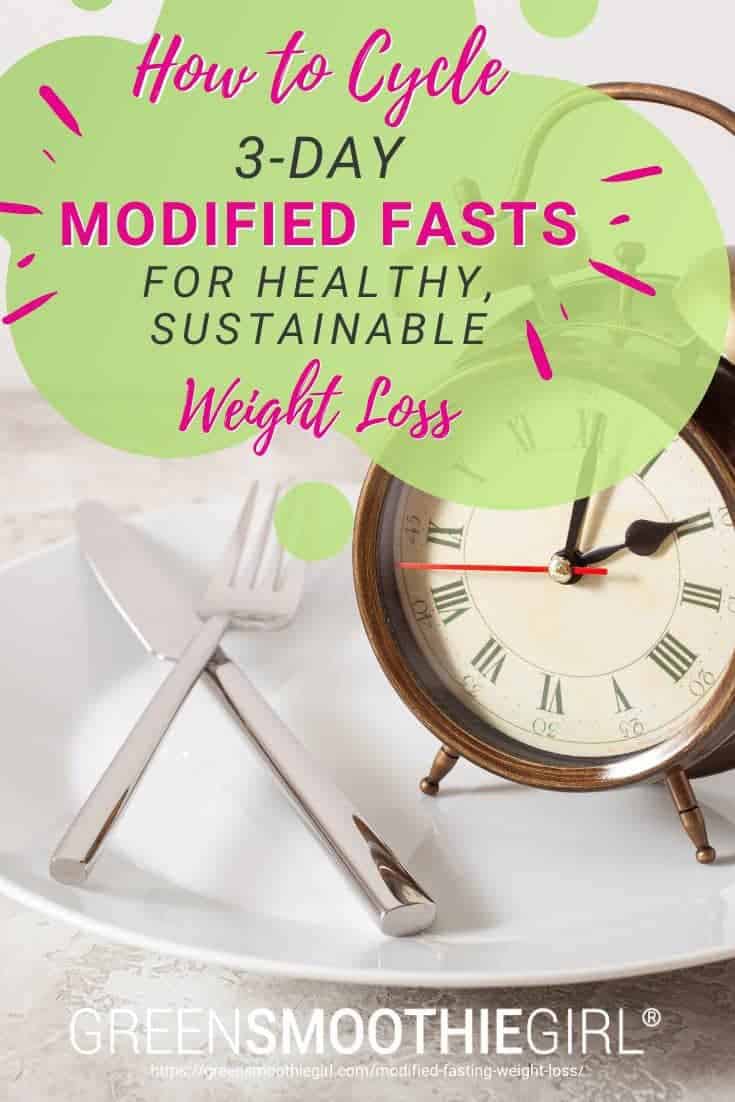How To Cycle 3-Day Modified Fasts For Healthy, Sustainable Weight Loss

Ever since new research on fasting won the Nobel Prize in 2016,1 it’s been the darling of health blogs, further research studies, and before-and-after photos on social media.
If weight loss is one of your goals, I’ve got good news: as a type of intermittent fasting, modified fasting is easy and incredibly effective. It might be the best way to fast, because you get all the benefits without getting particularly hungry!
[Related: 9 Tips For Sailing Through A 3-Day Modified Fast]
Not to mention that weight loss is just ONE of its health benefits!
In this post we’ll talk about WHY modified fasting is the ultimate tool for weight loss, whether fasting is a sustainable way to lose weight, the most effective way to cycle 3-day modified fasts for weight loss, and how much weight you can expect to lose.
In this article:
- Modified Fasting: The Ultimate Tool for Real Weight Loss
- Is Weight Loss From Fasting Sustainable?
- How to Cycle Modified Fasting for Weight Loss
- Tips for Reaching Weight Loss Goals with Modified Fasting
- TLDR: How to Cycle 3-Day Modified Fasts for Weight Loss
Modified Fasting: The Ultimate Tool for Real Weight Loss
Modified fasting is one of the most powerful tools for real, sustained weight loss. To really appreciate why that’s the case, it helps to understand how fasting improves insulin sensitivity, induces autophagy, and burns into fat stores:
Fasting Improves Insulin Sensitivity
Fasting makes a huge difference in how effectively your cells use insulin,2 or your insulin sensitivity. Which is a big deal, when more than 32% of American struggle with insulin resistance.3

What does all that mean for weight loss? Your body dispatches insulin in different amounts when you eat different foods. Insulin acts as a key, unlocking your cells and allowing the glycogen (energy) from the food you just ate, into your cells and then storing any excess as fat.
If your cells are constantly bombarded with an onslaught of too much sugar from processed, refined foods, your cells become desensitized to insulin’s attempts to insert excess glycogen. This is a protective response to keep your cells from being overwhelmed with too much glycogen. The more desensitized your cells become to insulin, the more glycogen left floating in your bloodstream, which ends up being packed away as body fat.
Fasting Allows You to Use Stored Fat — Without Lowering Your Basal Metabolic Rate
Why do our bodies store fat? For times of scarcity and famine, of course! For most of human history, our ancestors ate FAR less frequently. A lack of processed food meant that there was no proverbial cupboard stocked with sugary, refined snacks available at all times. Meals were prepared when food was available, which often wasn’t the case during winter or if there was a bad crop year.
Fat is your body’s way of storing up a dense energy reserve for the inevitable missed meals and periods of scarcity. However, your body isn’t interested in dipping into fat stores willy nilly. If you simply cut a few extra calories from your intake each day, your body’s metabolism will drop slightly to match it, preserving your fat stores.
However, if your body senses true food scarcity, it will switch to fat-burning mode, dipping into your fat stores for energy and actually raising your basal metabolic rate slightly (giving you the energy you need to seek out new sources of food, run from predators, and so on without becoming weak).
[Related: 3-Day Modified Fasting Eating Plan]
Fasting Induces Autophagy
Autophagy is your body’s recycling and regeneration mode. And the switch that flips autophagy into high gear is—you guessed it—fasting! During times of food scarcity, your body has evolved to redirect the energy it would otherwise spend on digestion (a tremendous undertaking) to flushing toxins from your cells, recycling damaged proteins and cell components (for energy!), and kicking stem cell growth into high gear.4
Autophagy helps foster and sustain weight loss by de-junking your cells and vital organs, allowing them to work properly during metabolism and hormone production. The body tends to store dangerous toxins and chemicals in the adipose tissue (away from vital organs!) which can make the body more resistant to losing weight. During periods of autophagy, your body can take advantage of the opportunity to flush both extra fat and waste buildup at the same time!
Is Weight Loss From Fasting Sustainable?
There are a million ways to lose weight. Just check out the number of diet books that pop up when you do a search on Amazon. But the thing is, most of those diets will lower your basal metabolic rate to match your calorie intake. This means you’re going to constantly plateau—or be forced to consistently make your diet more extreme—then ultimately gain the weight back over time when you reach your breaking point.
Any diet that doesn’t target the real issue of why we gain excess weight in the first place (insulin resistance and too much refined food and sugars in our diet) is bound to fail.
On the other hand, a lifestyle that includes the practice of regular fasting, combined with a diet of mostly unprocessed, mostly whole, mostly raw food, is just the ticket to better health and sustained weight loss. Fasting regularly, when combined with a solid diet, improves insulin sensitivity and eliminates excess fat stores.
How to Cycle Modified Fasting for Weight Loss
The very best way to cycle modified fasting for sustained weight loss is to make the practice a habit. Decide how often you will fast—whether once a week, month, or quarter—and then go a step further to decide which days of the week you will fast!

I recommend fasting Monday to Wednesday. For most people, these are busy work days. Pre-planned, quick meals are just the ticket! It’s also convenient to have Thursday and Friday open, in case a social outing or lunch meeting needs to be scheduled for later in the week.
Consistency and goals are key. Decide how much weight you want to lose, how quickly you want to achieve your goal, and start from there. Before you begin your first fast, check out these tips for sailing through a modified fast, as well as this Guide to Modified Fasting, and get started!
[Related: What Can You Drink During A Modified Fast?]
How Quickly Can I Expect to Lose Weight with Modified Fasting?
One of the amazing things about fasting is that the weight comes off relatively quickly. With each modified fast, you can expect to lose between 2-3 pounds. Fasting once per week, that’s as much as 8-12 pounds in one month.
By following a mostly unprocessed, mostly whole-foods diet that’s rich in nutrients and fiber, and maintaining a 12-hour eating window between fasts (or 14-16 if you want to see faster results), you can maintain your weight loss.
Each time you fast, your insulin sensitivity will improve. And as your insulin sensitivity improves and your body uses energy and insulin more efficiently, your propensity to gain excess weight (and crave too much food) will improve as well.
Tips for Reaching Weight Loss Goals with Modified Fasting
If weight loss is your goal, keep the following tips and best practices in mind!
- Drink lots of water. At least two quarts a day. Water is KEY to all metabolic processes, including healthy weight loss! While you fast, you’ll need more water than usual to flush toxins and waste from your body, and help your kidneys and liver work properly with that extra burden.
- Don’t yo-yo. Make modified fasting a sustainable habit, not a yo-yo experience. If you’re eating lots of processed, high-sugar foods between fasts, it will be much harder to reach your goals.
- Get plenty of fiber. Fiber helps you feel full and satisfied from a meal much longer. It’s also fantastic fuel for your microbiome! For a fiber boost that also helps quell hunger pangs while you’re fasting, try mixing a tablespoon of chia seeds with 8 oz. water and chugging it.
- Skip the artificial sweeteners. Even the zero-calorie ones. They’re full of toxins, put a great deal of stress on your body, and can even raise your insulin levels and cause metabolic problems!6
- Eat clean. Whether fasting or not, eat organic, whole foods whenever possible to decrease the amount of toxins and chemicals that enter your body.
- Steer clear of high fructose corn syrup. This highly refined type of sugar can’t be processed by your cells until it has been metabolized in the liver. It’s hard on your body, hard on your liver, and hard on your insulin levels.
- Avoid processed foods whenever possible. Not only are these foods difficult for your body to digest, inflammatory, and devoid of nutrients, but they don’t trigger satiety hormones7 the same way complex carbohydrates, healthy fats, and protein do! In other words, they won’t make you feel full, but they will trigger lots of insulin and raise your blood sugar. That's a surefire recipe for weight gain.

TLDR: How to Cycle 3-Day Modified Fasts for Weight Loss
Modified fasting is a form of intermittent fasting and powerful tool for sustained, healthy weight loss. Fasting helps you lose weight by improving insulin sensitivity, burning fat stores without lowering your basal metabolic rate, and inducing autophagy. Whether you have a little weight to lose or a lot, weight loss from fasting is sustainable, provided you maintain a healthy diet between fasts!
To set yourself up for success, make modified fasting a regular habit, set a specific goal, avoid artificial sweeteners and high fructose corn syrup, avoid processed foods, and drink lots of water!
Check out more posts and videos on modified fasting and the Flash Fast at GreenSmoothieGirl:

Disclosure: This post may contain affiliate links that help support the GSG mission without costing you extra. I recommend only companies and products that I use myself.

Resources
- Levine B, Klionsky DJ. Autophagy wins the 2016 Nobel Prize in Physiology or Medicine: Breakthroughs in baker's yeast fuel advances in biomedical research. Proc Natl Acad Sci U S A. 2017;114(2):201–205. doi:10.1073/pnas.1619876114
- Effect of intermittent fasting and refeeding on insulin action in healthy men. Halberg N, Henriksen M, Söderhamn N, Stallknecht B, Ploug T, Schjerling P, Dela F. J Appl Physiol. 2005;99:2128–2136.
- Gunners, Kris BSc. “Insulin and Insulin Resistance. The Ultimate Guide. Healthline. July 24, 2019.
- Mihaylova MM, Sabatini DM, Yilmaz ÖH. Dietary and metabolic control of stem cell function in physiology and cancer. Cell Stem Cell. 2014;14(3):292–305. doi:10.1016/j.stem.2014.02.008
- Muth, Natalie Digate. “What are the guidelines for percentage of body fat loss?” American Council on Exercise. December 2, 2009.
- Swithers SE. Artificial sweeteners produce the counterintuitive effect of inducing metabolic derangements. Trends Endocrinol Metab. 2013;24(9):431–441. doi:10.1016/j.tem.2013.05.005
- Hall K. D., Ayuketah A., Brychta R., Cai H., Cassimatis T., Chen K. Y., et al. (2019a). Ultra-processed diets cause excess calorie intake and weight gain: an inpatient randomized controlled trial of ad libitum food intake. Cell Metab. 30 66.e3–77.e3.
Posted in: Fasting, Healthy Weight















No comments found, but you can be our first!